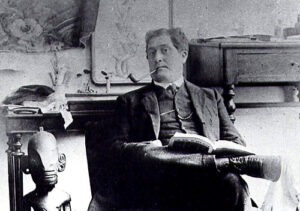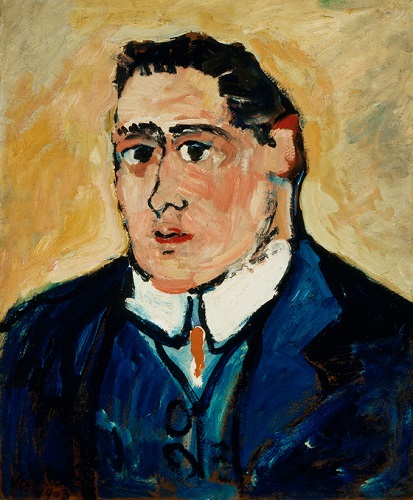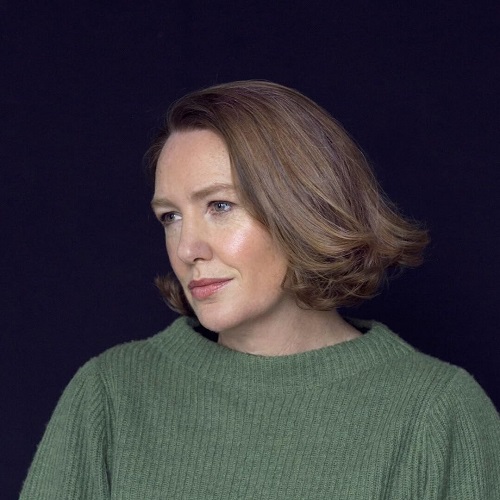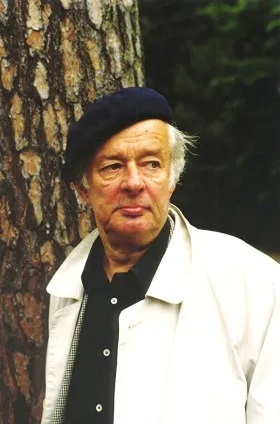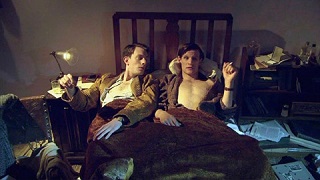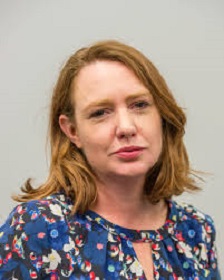De Brits-Amerikaanse schrijver Christopher Isherwood werd geboren op 26 augustus 1904 in Disley in het graafschap Cheshire in Engeland. Zie ook alle tags voor Christopher Isherwood op dit blog.
Uit: Goodbye to Berlin
“At any rate you could always, as Pieps explained to me, make a last-minute exit through the lavatory window into the courtyard at the back of the house: But you must be careful, Christoph,” he added: “Take a good big jump. Or you’ll fall down the coal-chute and into the cellar. I did, once. And Hamburg Werner, who was coming after me, laughed so much that the bulls caught him.” On Saturday and Sunday evenings the Alexander Casino was full. Visitors from the West End arrived, like ambassadors from another country. There were a good number of foreigners—Dutchmen mostly, and Englishmen. The Englishmen talked in loud, high, excited voices. They discussed communism and Van Gogh and the best restaurants. Some of them seemed a little scared: perhaps they expected to be knifed in this den of thieves. Pieps and Gerhardt sat at their tables and mimicked their accents, cadging drinks and cigarettes. A stout man in horn spectacles asked: “Were you at that delicious party Bill gave for the negro singers?” And a young man with a monocle murmured: “All the poetry in the world is in that face.” I knew what he was feeling at that moment: I could sympathise with, even envy him. But it was saddening to know that, two weeks hence, he would boast about his exploits here to a select party of clubmen or dons—warmed discreet smilers around a table furnished with historic silver and legendary port. It made me feel older.
At last the doctors made up their minds: Frau Nowak was to be sent to the sanatorium after all: and quite soon—shortly before Christmas. As soon as she heard this she ordered a new dress from the tailor. She was as excited and pleased as if she had been invited to a party: “The matrons are always very particular, you know, Herr Christoph. They see to it that we keep ourselves neat and tidy. If we don’t we get punished—and quite right, too. . . . I’m sure I shall enjoy being there,” Frau Nowak sighed, “if only I can stop myself worrying about the family. What they’ll do when I’m gone, goodness only knows. They’re as helpless as a lot of sheep. .. .” In the evenings she spent hours stitching warm flannel underclothes, smiling to herself, like a woman who is ex-pecting a child.
On the afternoon of my departure Otto was very depressed. “Now you’re going, Christoph, I don’t know what’ll hap-pen to me. Perhaps, six months from now, I shan’t be alive at all.” “You got on all right before I came, didn’t you?” “Yes . . . but now mother’s going, too. I don’t suppose father’ll give me anything to eat.” “What rubbish!” “Take me with you, Christoph. Let me be your servant. I could be very useful, you know. I could cook for you and mend your clothes and open the door for your pupils. .” . .”
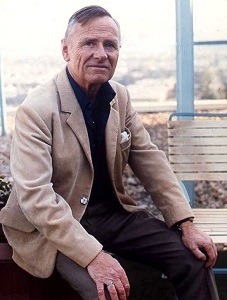
Christopher Isherwood (26 augustus 1904 – 4 januari 1986)
De Nederlandse dichteres Laura van der Haar werd geboren in Groningen in op 26 augustus 1982. Zie ook alle tags voor Laura van der Haar op dit blog.
avondpolder
trampolinespringende kinderen langs de vaart
op het erf slaan honden aan
zo’n dag
dat het zwaluwen waait in de boomgaard
een vrachtwagen op de dijk
als het bijna gaat regenen
warme fluitekruidgeur
van een beginnende avond
de kerkklok die bedeesd de tijd slaat
(die trouwens prachtig is)
en meer kan ik er niet bij hebben
geen knisperpaden, smoelzoete zomervakanties
alleen het blauw van dichtgeknepen ogen
is dat geen fijne kleur voor de natuur
stopper
ik wil best kijken, maar is het goed om dit te zien
iedereen weet dat er geen weg terug is
van gewoon kijken
naar niets gezien hebben
ze zouden langzaam kijken moeten uitvinden
om heel behoedzaam het zien te naderen
in een donkere kamer
vanuit een spoelbak
wachtend
zodat je weg kunt draaien, doorlopen, wissen
blijven stiften tot nieuwe beelden
alsmaar nieuwe beelden, lampen aan, praten
over wat er gisteren nou was, over later
hardop zingen tot het vol is in dat hoofd
of gaan slapen
als dat lukt
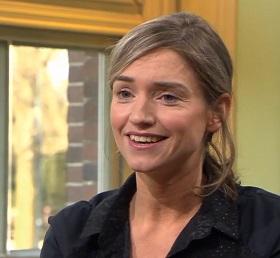
Laura van der Haar (Groningen, 26 augustus 1982)
De Nederlandse schrijver en dichter Cornelis Bastiaan Vaandrager werd geboren in Rotterdam op 26 augustus 1935. Zie ook alle tags voor C. B. Vaandrager op dit blog.
N.A.V. een scooterrit [met Polet]
Op twee wielen raast hij tussen de ruïnes. Wanhopig
probeert hij, verbergt hij,
probeert hij te verbergen
[gelijktijdig onnodig bevreesd voor vreemde ogen]:
zijn sturen is sturen met een schetsmatig aangegeven stuur.
En
een onbedienbaar [want smeltend] dashboard, d.w.z.
door hem onbedienbaar.
Hij herkent de resten van een klaagmuur, kwarts,
driekwart zuil van een kersvers paviljoen,
een jezuswreefje met een spijker, verder
een vochtige steen, cement, een verschroeid montuur,
een gouden hoektand [dat de ruimers die vergaten!].
Cement dus, waartussen wellicht een goedkope vulling
uit een vroeg door tandwolf aangetast gebit.
Hier, denkt hij, al weer kilometers verder,
was eens een pleisterplaats:
een voor omsmelten ongeschikte zwengel van een dorpspomp,
een hoefijzer
en een witte splinter van een paardenschedel.
Het zijn minder dan flitsen van impressies. Ontroerd
[hij wil stoppen, denken, bloemen kopen]
zoekt hij een knop, een remstang.
Hij drukt op de verkeerde knop.
Drukt hij wel op een knop
Er is geen knop.
Kan hij het helpen? Hij huilt achter zijn bezwete stofbril.
Onweersvliegjes vliegen zich te pletter op het glas.
Op twee wielen raast hij [verder] tussen de ruïnes.
De luchtdruk deert hem niet: zijn geluiddempende valhelm.
Toch valt hem, vlak voor de bebouwde kom,
door een gelukkige slag in de lucht een souvenir ten deel:
vijfendertig lange blonde vrouwenharen,
die hem kriebelen
en stijf tegen de lippen blijven liggen.
Eenmaal in de verlaten buitenwijken
is het tintelen onder de nagels
haast niet meer te verdragen
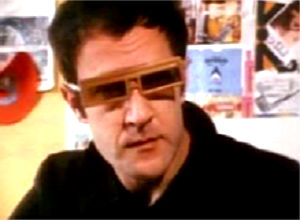
C. B. Vaandrager (26 augustus 1935 – 18 maart 1992)
De Britse schrijfster Paula Hawkins werd geboren op 26 augustus 1972 en groeide op in Salisbury (het huidige Harare in Zimbabwe) in Rhodesië. Zie ook alle tags voor Paula Hawkins op dit blog.
Uit: In het water (Vertaald door Ineke de Groot)
“De Verdrinkingspoel
Libby
‘Nog eens! Nog eens!’
De mannen binden haar vast voor de tweede proef. Maar deze keer met haar linkerduim aan haar rechterteen en haar rechterduim aan haar linkerteen. Het touw gaat weer om haar middel. Deze keer dragen ze haar het water in.
‘Alsjeblieft,’ smeekt ze, omdat ze niet weet of ze het duister en de kou wel kan verdragen. Ze wil terug naar een huis dat niet meer bestaat, naar de tijd dat ze samen met haar tante bij het vuur zat en ze elkaar verhalen vertelden. Ze wil in hun huisje in haar eigen bed liggen, ze wil weer klein zijn en het houtvuur, de rozen en de zoete warmte van haar tantes huid ruiken.
‘Alsjeblieft.’
Ze zinkt. Tegen de tijd dat ze haar er weer uit sleuren, zijn haar lippen blauw en is haar adem voorgoed vervlogen.
Je wilde me wat vertellen, hè? Wat was het eigenlijk? Ik heb al een tijdje mijn hoofd niet meer bij het gesprek. Ik kon me niet meer concentreren, dacht aan andere dingen, was ergens anders mee bezig, ik luisterde niet en raakte de draad kwijt. Nou, je hebt mijn aandacht weer weten te trekken. Alleen heb ik wel het gevoel dat ik een paar belangrijke dingen heb gemist.
Toen ze het me kwamen vertellen, was ik kwaad. Aanvankelijk was ik opgelucht, want als er opeens twee politiemensen op de stoep staan, terwijl jij net je treinkaartje aan het zoeken bent omdat je op het punt staat om naar je werk te gaan, slaat de angst je om het hart. Ik was bang dat er wat was gebeurd met iemand om wie ik geef: mijn vrienden, mijn ex, mijn collega’s.”
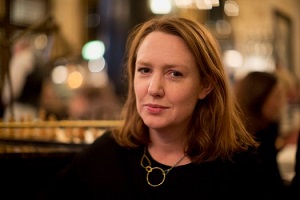
Paula Hawkins (Salisbury, 26 augustus 1972)
De Duitse schrijver Joachim Helfer werd geboren in Bonn op 26 augustus 1964. Zie ook alle tags voor Joachim Helfer op dit blog.
Uit: To call a spade a spade
“He earnestly explores and exposes some real life facts about what he and I think, feel, and actually do in terms of gender-roles, sexuality, and procreation. He surely needs nobody to excuse him for it.
It is I who has to ask forgiveness: Rashid, nobody else. Not for a word I have written, or the scholastic form of intermittent commentary I have chosen. For the mirroring disagreement about what / wrote I can but yet again point to what simply reading my text cannot miss, yet routinely gets ignored by the critics: My part of the twin-text is in no way limited to commenting on Rashid’s. Rather, it tells my side of the story, my first-hand experience with Rashid and with Beirut. What I need to — once more —say “Sorry!” for, is my lack of back-bone in dealing with my publishers. Suhrkamp, for sheer stinginess on printing-paper, set the German version (“Die Verschwulung der Welt”) in such a way that my comments immediately interrupt Rashid’s text, without letting it stand for itself first. That is a cruel thing to do to a text. Laudably, the recent American edition of Texas University Press under the title “What makes a man” rights that wrong by printing Rashid’s text twice: first without, then with my interrupting comments. The editors in Austin went even further in their largesse on printing-paper, and add half a dozen critical essays to our twin-text. They, too, seem to have felt that the fruit on its own might cause serious irritation in the intellectual stomachs of their ever more sensitive readers. In the age of `trigger-warnings’, I fear this fear is only too justified.
The essays in the American edition mostly repeat the partisan critical reception the twin-text has met in Germany, without doing much in terms of analysing it. In both languages, our mutual descriptions are usually regretted as a misunderstanding. Our shared best effort to understand both the other and us-selves in contact with the other, and the insights it indeed produces, are largely ignored. Rather, I get some cheap shots for alleged orientalism, Rashid for alleged sexism.“
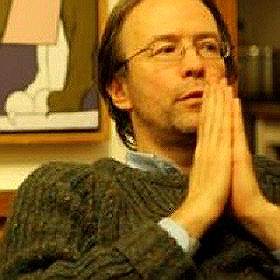
Joachim Helfer (Bonn, 26 augustus 1964)
De Franstalige schrijver en dichter Guillaume Apollinaire werd in Parijs geboren op 26 augustus 1880. Zie ook alle tags voor Guillaume Apollinaire op dit blog
À Nîmes
Je me suis engagé sous le plus beau des cieux
Dans Nice la Marine au nom victorieux
Perdu parmi 900 conducteurs anonymes
Je suis un charretier du neuf charroi de Nîmes
L’Amour dit Reste ici Mais là-bas les obus
Épousent ardemment et sans cesse les buts
J’attends que le printemps commande que s’en aille
Vers le nord glorieux l’intrépide bleusaille
Les 3 servants assis dodelinent leurs fronts
Où brillent leurs yeux clairs comme mes éperons
Un bel après-midi de garde à l’écurie
J’entends sonner les trompettes d’artillerie
J’admire la gaieté de ce détachement
Qui va rejoindre au front notre beau régiment
Le territorial se mange une salade
À l’anchois en parlant de sa femme malade
4 pointeurs fixaient les bulles des niveaux
Qui remuaient ainsi que les yeux des chevaux
Le bon chanteur Girault nous chante après 9 heures
Un grand air d’opéra toi l’écoutant tu pleures
Je flatte de la main le petit canon gris
Gris comme l’eau de Seine et je songe à Paris
Mais ce pâle blessé m’a dit à la cantine
Des obus dans la nuit la splendeur argentine
Je mâche lentement ma portion de bœuf
Je me promène seul le soir de 5 à 9
Je selle mon cheval nous battons la campagne
Je te salue au loin belle rose ô tour Magne
Annie
Sur la côte du Texas
Entre Mobile et Galveston il y a
Un grand jardin tout plein de roses
Il contient aussi une villa
Qui est une grande rose
Une femme se promène souvent
Dans le jardin toute seule
Et quand je passe sur la route bordée de tilleuls
Nous nous regardons
Comme cette femme est mennonite
Ses rosiers et ses vêtements n’ont pas de boutons
Il en manque deux à mon veston
La dame et moi suivons presque le même rite
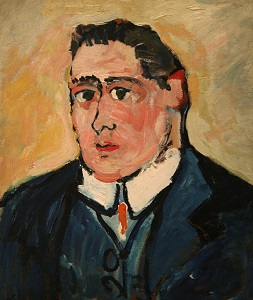
Guillaume Apollinaire (26 augustus 1880 – 9 november 1918)
Portret door Maurice de Vlaminck, ca. 1905
Onafhankelijk van geboortedata:
De Libanese schrijver Rashid Al-Daif werd in 1945 geboren in Ehden bij Zgharta in het noorden van Libanon. Zie ook alle tags voor Rashid Al-Daif op dit blog.
Uit: Die Verschwulung der Welt (Samen met Joachim Helfer)
„Eigentlich war ich es, dessen Entwicklung abgeschlossen war. Meine Befürchtungen waren ein für allemal verschwunden, und ich trauerte ihnen nicht nach. Mein Sohn war damals vierzehn Jahre alt und lebte bei mir in Beirut. Vorher hatte er bei seiner französischen Mutter in Lyon gewohnt und war dort zur Schule gegangen.
Während er dort lebte, hatte ich mir aus zwei Gründen riesige Sorgen um ihn gemacht: daß er drogenabhängig und daß er homosexuell werden könnte. Ich hielt mich immer auf dem laufenden über ihn und überprüfte alles, was ich über ihn erfuhr, daraufhin, ob auch keiner dieser zwei möglichen Unglücksfälle eingetreten war.
Mein Sohn hatte seit seinem dritten Lebensjahr mit seiner Mutter in Frankreich gelebt, die dorthin zurückgegangen war, nachdem wir uns hatten scheiden lassen.
Wir hatten vereinbart, daß seine Mutter ihn mitnimmt, denn Beirut erlebte damals die schlimmsten Tage des Bürgerkrieges. Mit vierzehn Jahren kam er wieder nach Beirut, um die Oberschule abzuschließen. Ich war froh über seine Rückkehr, denn in Frankreich hätte er leicht homosexuell werden können, in Beirut dagegen war dies nur schwerlich möglich. So fühlte und dachte ich damals. Aus tiefstem Herzen wünschte ich mir, daß mein Sohn so werden würde wie ich, nur »tausendmal besser«. Vielleicht wollte ich damals auch, daß er »einer von uns« würde – mit »uns« meine ich die Libanesen, die Araber, die Orientalen –, aber natürlich ohne unsere chronischen schlechten Angewohnheiten.
Ich mochte dieses Mädchen, die Freundin meines Sohnes, und wünschte mir, die beiden würden sich lieben und für immer zusammenbleiben. Ohne jeden Zweifel ist es mir auch noch jetzt, da ich diese Worte schreibe, lieber, daß mein Sohn nicht homosexuell ist, und ich zögere nicht, dies zuzugeben. Das heißt aber nicht, daß ich mich von ihm lossagen würde, wenn er es wäre. Ich würde ganz sicher zu ihm stehen.
Ich sagte mir also: Warum nicht?, als Thomas Hartmann mich über die Homosexualität meines Kollegen in Kenntnis setzte.
Vielleicht wäre dies eine gute Gelegenheit, offen gelebte Homosexualität einmal aus der Nähe kennenzulernen, gerade in Berlin, wo jedes Jahr eine riesige Homosexuellen-Parade stattfindet.“
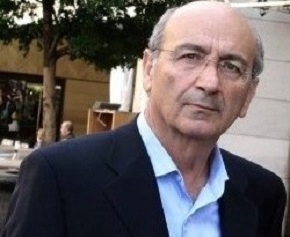
Rashid Al-Daif (Ehden, 1945)
Zie voor nog meer schrijvers van de 26e augustus ook mijn vorige blog van vandaag.

